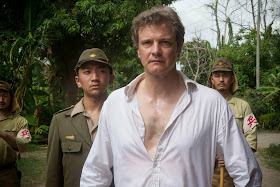Revolutions are produced by men of action, one-sided
fanatics, geniuses of self-limitation. In a few hours or days they overturn the
old order. The upheavals last for weeks, for years at the most, and then for
decades, for centuries, people bow down to the spirit of limitation that led to
the upheavals as to something sacred.
—Doctor
Zhivago
Boris Pasternak
We resembled the great Inquisitors in
that we persecuted the seeds of evil not only in man’s deeds, but in their
thoughts. We admitted no private sphere, not even inside a man’s skull.
—Darkness
at Noon
Arthur Koestler
Link on the power of poetry
The following is a selection from an early blog on this webpage. This material did not make it into That Line of Darkness: The Gothic from Lenin to bin Laden (Encompass Editions, 2013) for reasons of space.
“Music is the great uniter. An incredible force.
Something that people who differ on everything and anything else can have in
common.”
―Just Listen
Sarah DessenLink on the power of poetry
The following is a selection from an early blog on this webpage. This material did not make it into That Line of Darkness: The Gothic from Lenin to bin Laden (Encompass Editions, 2013) for reasons of space.
 |
| Anna Akhmatova |
The gifted and enormously resilient Anna Akhmatova
felt the need to continue the tradition of earlier poets and assume a moral
responsibility to be the voice of memory by bearing witness to these ghastly
times. Between 1935 and 1940, although she dared not speak it aloud because she
was under conspicuous surveillance by the NKVD, who clearly intended to
intimidate her, Akhmatova ended her silence by sculpting in words a memorial to
the victims of the Stalinist terror, Requiem (not published in Russia during
her lifetime) that expressed with searing emotional clarity what others could
only feel. It was written on scraps of paper, a fragment read silently by a
friend who committed it to memory and burned the paper. Grounded in personal
experience, she stood in a prison queue with a food parcel for her son, after
he (who was arrested repeatedly), and her lover were arrested within a couple
of weeks of each other primarily as hostages to ensure her compliance. Standing
in that line with women also desperate for news of their loved ones, Requiem is a testament to their suffering and
by extension the anguish of a whole people. As her preface makes clear, she
would connect her personal experience with all those other women:
In the terrible years
of the Yezhov terror, I spent seventeen months in the prison lines of
Leningrad. Once, someone ‘recognized’ me. Then a woman with bluish lips
standing behind me, who, of course, had never heard me called by name before,
woke up from the stupor to which everyone had succumbed and whispered in my ear
[everyone spoke in whispers there]:
‘Can you describe this?’ And I answered: ‘Yes, I
can.’ Then something that looked like a
smile passed over what had once been her face.
With a piercing honesty that cuts through the miasmic fog of lies and fantasy, Akhmatova captures the intense pain of these women left behind, the fabric of their lives dissolved in grief, loneliness and despair:
smile passed over what had once been her face.
With a piercing honesty that cuts through the miasmic fog of lies and fantasy, Akhmatova captures the intense pain of these women left behind, the fabric of their lives dissolved in grief, loneliness and despair:
And
like a useless appendage, Leningrad
Swung from its prisons.
And
when, senseless from torment,
Regiments of convicts marched,
And
the short songs of farewell
Were
sung by locomotive whistles.
The
stars of death stood above us
And
innocent Rus writhed
Under bloody boots
And
under the tires of the Black Marias.
They
led you away at dawn,
I
followed you, like a mourner,
In
the dark front room the children were crying,
By
the icon shelf the candle was dying.
On
your lips was the icon’s chill.
The
deathly sweat on your brow …
Unforgettable!









